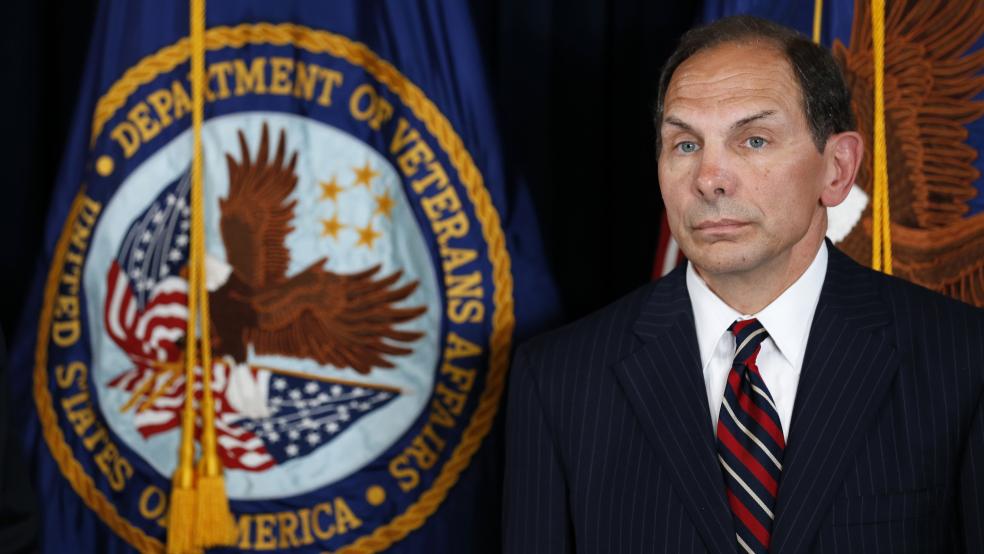Just a day after President Obama nominated former Procter & Gamble CEO Bob McDonald to take charge of the Department of Veterans Affairs – calling him “one of our nation’s most accomplished business leaders and managers” – there are signs McDonald may not be the panacea for what ails the troubled agency.
McDonald abruptly retired from P&G on May 23, 2013, after four often-tumultuous years at the helm of the major consumer products company.
Related: Former Procter & Gamble CEO Faces Career Challenge of a Lifetime at VA
He told employees at the time that he was worried persistent speculation about his job status had become too big “a distraction” to the company. Ironically, former VA secretary Eric Shinseki offered the same explanation when he resigned on May 30.
Shinseki, a decorated former Army general, came under fire amid an uproar over reports that as many as 40 veterans died while waiting for appointments to see a doctor at a VA medical center in Phoenix, Ariz. Some hospital officials and staff in Phoenix and elsewhere had covered up the prolonged wait list in order to protect their bonuses and avoid bad personnel evaluations.
A blistering administration report presented to Obama last Friday concluded that the VA has “significant and chronic system failures” and a “corrosive culture” of denial and cover up that discouraged whistleblowers from speaking up.
Obama described McDonald, a former Army captain and West Point graduate who spent 33 years rising to the top of the Cincinnati-based P&G, as a change agent well suited to transform the hidebound agency into a more efficient and reliable provider of benefits and health care for veterans.
Related: McDonald’s VA ‘To-Do List’ Includes 6 Urgent Fixes
“What especially makes Bob the right choice to lead the VA right now is his three decades of experience in building and managing one of the world’s most recognized companies, Procter & Gamble,” Obama said Monday afternoon.
The Senate, of course, will have the final say about McDonald’s appointment when he comes before them for his confirmation hearings, which have yet to be scheduled.
Yet as The New York Times reported yesterday, “To some investors, he [McDonald] was too loyal to the company’s traditions and too slow to pursue layoffs and other cuts.” The massive conglomerate, with more than $80 billion in annual sales and 120,000 employees, is probably best known for its Tide and Gillette products. Last year, it had a global media budget of more than $10 billion annually.
While heading up P&G, McDonald did not produce “sparkling new product innovations that could have increased the stock price,” The Times reported. Moreover, he was perceived as less of a visionary than his predecessor, A.G. Lafley, who came back to replace McDonald after his unexpected departure.
The Cincinnati Enquirer noted last December that while “being a CEO is tough in the best of circumstances,” “McDonald’s last 13 months at P&G … were extraordinary.”
Related: VA Bill Means a New $50 Billion Entitlement
Here’s why: McDonald’s corporate drama unfolded with the prolonged economic downturn as a backdrop. In April 2012, “analysts jumped him on a conference call” and demanded to know why P&G’s results and stock price were lagging behind Colgate Palmolive Co., Kimberly-Clark and other corporate rivals, according to The Enquirer.
“Two months later, P&G lowered its guidance for the fourth quarter. In July 2012, activist investor William Ackman announced his hedge fund, Pershing Square Capital Management, had taken a stake in P&G. It amounted to only about one percent,” wrote The Enquirer — but shortly thereafter Ackman began demanding McDonald’s resignation.
Ali Dibadj, an analyst at Sanford C. Bernstein in New York, told The Times this week that many P&G products were too expensive compared with those of competitors and that “the company was slow to expand in emerging markets.”
P&G’s board publicly backed McDonald as criticism grew, but McDonald himself acknowledged the company hadn’t “been hitting on all cylinders internally” and that there was an urgent need for sharper focus.
The company launched a $10 billion cost-cutting initiative, and in June 2012, P&G announced it would “concentrate on its 40 biggest category and country combinations, its 20 largest innovations and its 10 most lucrative developing markets,” according to The Enquirer.
Related: Shinseki Falls on Sword in VA Scandal
It took a while for those changes to have impact, but from July 2012 until McDonald retired last year, P&G’s stock climbed 21 percent. Throughout his time as CEO, the stock rose 54 percent, The Enquirer reported. Ackman, meanwhile, watched another Pershing Square investment, J.C. Penney, implode last year.
“If McDonald is irritated or amused by the irony, he’s not sharing,” according to The Enquirer, which interviewed McDonald late last year. “He declined to discuss specific events during his tenure as CEO, saying he did not want to create distractions for P&G.”
Yesterday, Obama and the White House had nothing but glowing things to say about McDonald and his years at Procter & Gamble. “Those management chops are going to be critical to his success, and they’re going to be critical to ensuring that our country lives up to the commitment that we’ve made to our men and women in uniform,” said White House Press Secretary Josh Earnest.
Top Reads From The Fiscal Times:





